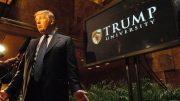Last week, a federal judge in Florida refused to dismiss a privacy lawsuit brought by New York Giants defensive end Jason Pierre-Paul against ESPN for showing readers a copy of the NFL superstar’s medical chart revealing an amputated right finger. At the time of the decision, the judge’s analysis wasn’t immediately available, but on Monday, U.S. District Court judge Marcia Cooke issued a written order. The decision reveals some language that could be concerning to news outlets.
In the lawsuit, Pierre-Paul asserted a couple of claims. One was that by disclosing confidential medical records, ESPN and its reporter Adam Schefter had violated Florida’s medical privacy law. Judge Cooke rejects such a claim, reasoning that Florida’s law mainly curbs the action of health providers, not a journalist.
That makes the reasoning surrounding the other claim — an invasion of privacy by public disclosure of private facts — to be curious, to say the least. Now while it’s true that at the early pleading stage, all Pierre-Paul had to do was to demonstrate the plausibility of his claims, he had to survive some heightened scrutiny because he was challenging material that ESPN argued was “newsworthy” and protected under the First Amendment.
In her order (read here in full), Cooke nods to the freedom of the press and its “reasonable leeway to choose what it will tell the public,” but also states that there are limits on disclosing private facts anchored to “common decency” and “to the feelings of the individual and the harm that will be done to him by the exposure” — that by sharing medical records not publicly available, ESPN may have breached these limits.
That’s not the end of the analysis, however.
Notably, she points to Bartnicki v. Vopper, a 2001 Supreme Court case that was widely cited at the time of the Sony hack. The Bartnicki case concerned union officials whose intercepted cellphone conversations landed in the hands of a radio commentator who broadcast the contents. The high court gave the media defendants a pass from violating a federal wiretap law as “their access to the information on the tapes was obtained lawfully, even though the information itself was intercepted unlawfully by someone else.”
Bartnicki is an important case for the media. It’s one that bolsters their confidence when, say, reporters at The New York Times publish state secrets provided to Wikileaks.
Cooke, though, takes a rather peculiar reading of Bartnicki, quoting the portion, “It also left open the question whether, in cases where information has been acquired unlawfully by a newspaper or by a source, government may punish not only the unlawful acquisition, but also the ensuing publication.”
There, the high court was referring to an earlier case (New York Times Co. v. United States). Cooke refrains from quoting the very next line: “The issue here is a narrower version of that question: Where the publisher has lawfully obtained information from a source who obtained it unlawfully, may the government punish the ensuing publication based on the defect in a chain?”
The Supreme Court’s decision was “no.”
So Cooke writes, “If Schefter secured Plaintiff’s records unlawfully, Defendants may not be afforded First Amendment protections that could otherwise apply in publishing these records.”
How might Schefter have secured the records unlawfully? Did he hack into the hospital’s digital system? That seems unlikely. Instead, Cooke appears to have implicitly blessed Pierre-Paul’s theory in his opposition to a motion to dismiss. There, the NFL star’s lawyers argued, “Where, as here, a defendant accepts information from a source with knowledge of the illegality of the source’s disclosure, the defendant has unlawfully obtained the information and is not shielded against liability for subsequent disclosure.”
That issue of knowledge of the illegality could be a real trouble-spot for media if other judges adopt this standard. Of course, in light of Hulk Hogan’s victory against Gawker, many will be concerned with the broader notion of how privacy might trump free speech, but this other issue shouldn’t be obscured.
As ESPN wrote in its reply brief to Pierre-Paul, “Forty decades of First Amendment case law has consistently held that a journalist does not unlawfully obtain information by allegedly accepting it with knowledge that a source’s disclosure was illegal. And for good reason — otherwise, journalists would essentially become policemen to enforce the confidentiality obligations of their sources. Rather, in order for information to qualify as ‘unlawfully obtained’ for First Amendment purposes, the journalist — and not just the source — must have broken some law by the manner in which he or she physically obtained the information.”
Judge Cooke, at least for the time being, appears not to have paid much heed to this argument.
Source: www.hollywoodreporter.com




